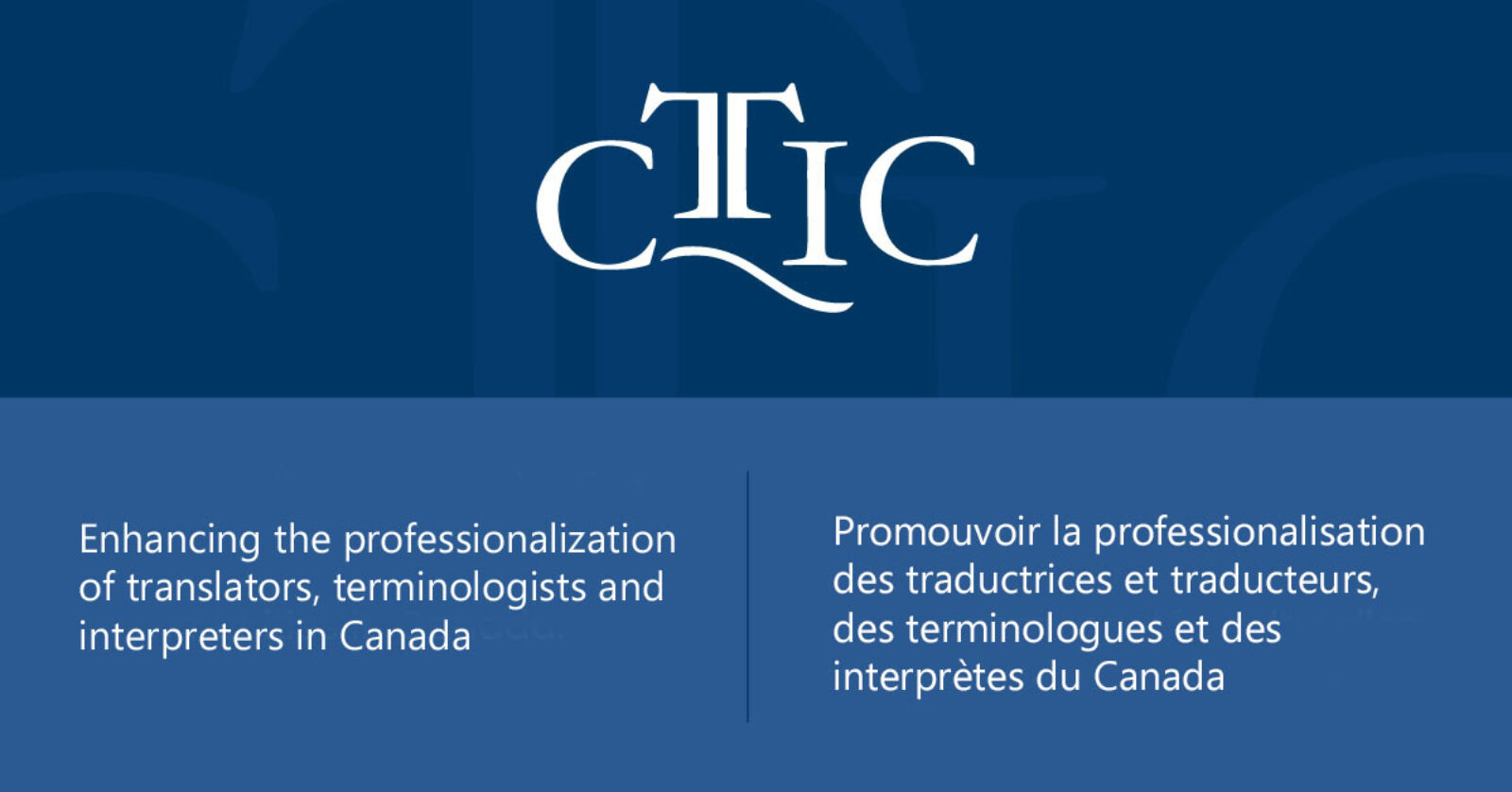An interview with Angela Fairbank, CTTIC Vice-President (2019-2022), previously published in the STIBC Voice Newsletter, January 2021, pages 7 to 9.

Translator, Terminologist, Interpreter – which of these three professions do you identify with?
Though I spent a few years freelancing part-time as a conference interpreter, I’ve been a translator from English to French for over 20 years.
Please provide a brief synopsis of your education – including language education – and background related to how you came to be a Translator, Interpreter or Terminologist. For example, immersion in foreign countries and culture, university education, mentorship/menteeship, internship, etc.
I was always fascinated by languages – and I’ve studied more than a few over the years – which is why I chose to attend university and study theoretical linguistics. This training gave me a better understanding of the organization and structure of language and it still helps me today in my work as a translator. After teaching French as a Second Language for a few years, I became tired of spending all my time preparing for the next day’s classes and I began doing freelance translation. I was lucky enough to find a few established translators who were willing to revise my work, and one of them eventually helped me land my first full-time job as a translator for a national retail chain. There the translators would revise each other’s work and this was a great learning experience. My next job was translating legislation for Manitoba Justice and there too everyone’s work was revised. I believe this was instrumental in giving me the tools to grow as a translator and later as a reviser. We translate for people we don’t know and it’s crucial that we learn how our texts are perceived by others.
Are you currently working in-house or as a freelancer? If you have had experience in both types of employment, which do you prefer?
I occasionally work as a freelancer, but I much prefer working in-house. I feel that I can deliver better quality work in-house: I have a much better understanding of the client and the product, I get to consult the writers and influence the source text, and I can take ownership of the final product. Working in-house provides me with an environment where I can constantly strive to hone my craft.
Where do you currently exercise your profession?
I am currently Director of Legislative and Parliamentary Translation for Manitoba Justice. A team of five translators (officially called jurilinguists) works with me to translate the province’s legislation and to offer translation services to the Manitoba Legislative Assembly. I started there as a junior translator in 2001 and worked my way through every position until I became Director in 2015.
The legislative drafters for the English version work in the same office as the jurilinguists, and we work closely together to create the best possible product in both languages. Most of my work consists in revising and mentoring the team of jurilinguists to create a French version that has the exact same legal effect as the English, while crafting a clear, precise and concise message. Because the vast majority of our work comes from two clients only, we have a finite amount of work to complete and instead of focusing on production, we can focus on creating quality translations that will be public for decades and need to stand scrutiny before the courts. Quality is the most important aspect of our work, and I feel very privileged to be there.
Are you certified in your profession? If so, by which certification organization(s), and for how long have you been certified now? If you are certified, once you became certified, did you notice your income increase slightly, moderately or substantially? Usually it is freelancers who choose to become certified. However, since you are not a freelancer, why did you decide to become certified anyway?
I became certified with ATIM in 2002. Because I was working in-house, and I still work at the same place, I didn’t see any difference in salary caused by certification. I wanted to become certified because I saw it as a professional goal and responsibility.
What have been some of the highlights of your career so far?
The work we have been doing this year related to the pandemic will likely remain very memorable. We translate health orders and various other texts aimed at helping the government adapt to these new conditions and at facilitating health services like vaccination. We get a sense that our work has a direct impact on the population. We were also invited to work from inside the Legislative Assembly Chamber during a special session earlier this year, which was a rare honour and a first for any translator.
Have there been any particular challenges in your profession you would like to share with our readers?
Manitoba’s legislation needs to be bilingual to be legally effective, and both linguistic versions can be challenged before the courts. This means that we need to strive to understand every aspect and implication of the source and target texts, while creating a well-written product that integrates with the rest of our statutes and regulations. This creates a mentally challenging and rewarding environment where striving for the best matters, and is encouraged.
What advice do you have for colleagues who are just starting – or thinking of starting – today?
Improvement will not come by chance. You are the steward of your own progress; you need to work on your craft through deliberate practice: ask for feedback from more experienced translators, make note of your weaknesses, and work on them relentlessly. If you continually strive to become better at what you do, you will have a successful and rewarding career.
As Past President of ATIM – Association of Translators, Terminologists and Interpreters of Manitoba – could you please tell us a little bit about the association, i.e. how many members it has, when it was founded, and please feel free to mention any particular achievements made during your time on the board of ATIM to help it grow as well as what challenges, if any, still need to be met.
ATIM has grown to about 68 members and 10 associates (a newer category for us). While I was president (until this past October), we rewrote the by-laws, started admitting community interpreters, created an associate category, digitized our archives, and created a test on the code of ethics that’s become a requirement for admission. We are in the process of reaching an agreement with the provincial government to obtain recognition for ATIM’s unique status in the province as a certifying body – a more flexible arrangement than obtaining title protection through legislative means. The Association is still opening up to non-official language combinations, and offering training opportunities continues to be a challenge, but ATIM is financially solid and has a bright future ahead.
You have just been elected to your second term as President of the Board of CTTIC – – Canadian Translators, Terminologists and Interpreters Council. Congratulations! Please tell us how you originally became involved in CTTIC, why you chose to serve in this position, and why our readers might consider serving on CTTIC’s board next year when all positions are up for renewal once again.
I first attended a CTTIC AGM as president of ATIM in 2017. I wanted to get involved because I thought it would help me in my work with ATIM and I wanted to know what was happening elsewhere in the country. CTTIC had just begun rebuilding itself, and I wanted to be part of that. There are limits to what CTTIC’s volunteer board can achieve, so we initially made the conscious decision to focus on serving the seven member societies and securing the certification exam before moving on to other outreach activities. Starting last year, thanks to a full and active board, we have been able to expand our activities and increase communications with the provinces. As you mention, many of the board members are here for one last year, myself included (this is my last of three possible mandates), so a number of positions will open up in November, and we need new board members to continue serving the provinces and their members. If there is something you would like to change or see happen, any project you would like to steer, or if you think you can contribute in any way, please contact CTTIC directly. All CTTIC-affiliated certified members are eligible to sit on the board. We need your help!
